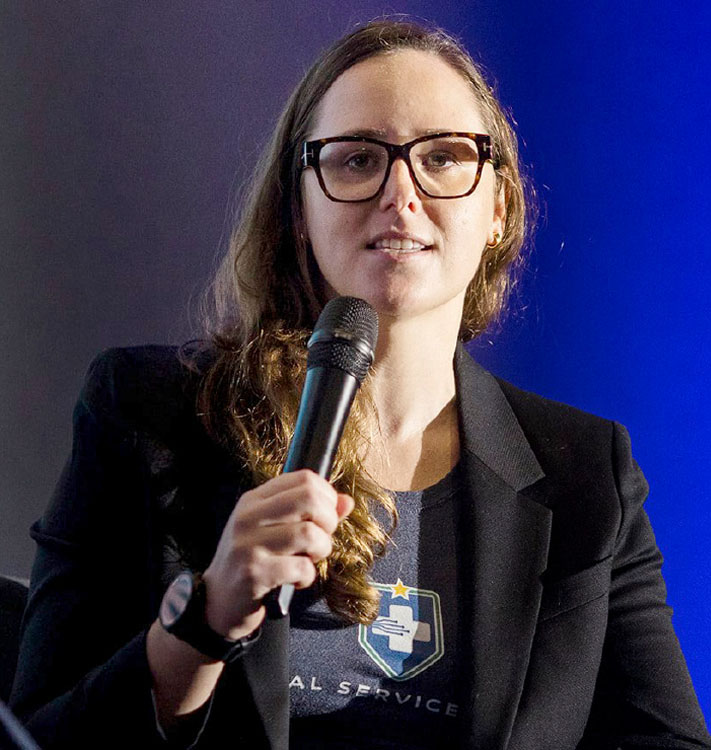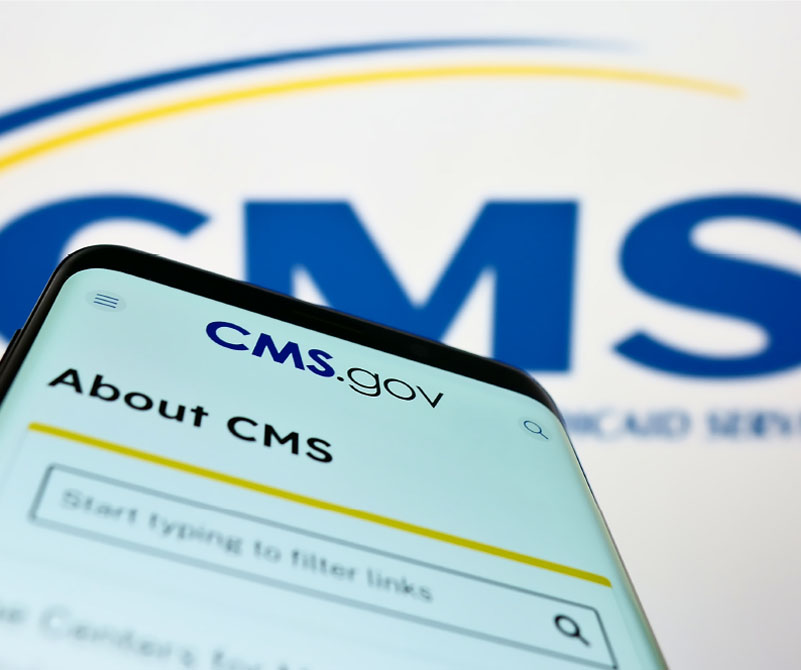
Bridging Innovation and Access
Insights from Andrea Fletcher, Chief Digital Strategy Officer and Director of the Digital Service, Centers for Medicare & Medicaid Services
By Michael J. Keegan
Andrea Fletcher serves as the chief digital strategy officer (CDSO) and director of the Digital Service at the Centers for Medicare & Medicaid Services (CMS). She explains that her office was established to address the need for talent and expertise in a variety of skills to tackle complex problems at the intersection of technology, innovation, and service design and delivery. The CMS digital transformation strategy focuses on improving the user experience and delivering better digital services to its beneficiaries.
Fletcher joined me on The Business of Government Hour to discuss the intricate landscape of digital transformation and delve into the innovative strategies and initiatives driving digital transformation across CMS, offering key insights into the future of healthcare service delivery. The following is an edited excerpt of our discussion, complemented with updated and additional research.
On Being the Chief Digital Strategy Officer and Director of Digital Service
As its director, Digital Service at CMS, she leads a team of technical experts who work on both the public-facing and program-facing technology at CMS. This includes addressing complex problems with a technology lens and working on systems that interact directly with beneficiaries. In her role as chief digital strategy officer, she is charged with shaping the overall digital strategy for CMS.
Her focus is on improving customer experience, advancing digital services, and pushing for a digital first approach. She emphasizes the need for her team to act as a “translation service,” bridging the gap between government, healthcare, and technology languages. This involves understanding and integrating the different vocabularies and processes of these domains to effectively solve problems.

Fletcher’s role involves deploying talented individuals to tackle challenging problems. Her team is tasked with forming quickresponse teams to address issues with a technology focus and develop innovative solutions. She notes that part of her job is to attract and retain skilled professionals and to foster a culture where they can effectively contribute to the agency’s goals. This includes mentoring team members and facilitating their growth within the government.
“My team,” explains Fletcher, “sits in the office of the administrator at CMS. Our job is to take hard problems that people are thinking through that might have a technology lens and deploy smart people who have backgrounds in technology to try to understand and solve those problems.”
Accessibility and User-Centric Design
A key aspect of the CMS digital strategy is to ensure that the technology and digital services provided are user-friendly and meet the needs of beneficiaries. Fletcher’s team prioritizes designing systems and interfaces that are intuitive and accessible to users, advocating for their needs and ensuring that technology serves them effectively.

“Our job,” notes Fletcher, “is to be the champion of ‘can a real person use this?’ Do they understand the language? Is it simple? Does it make sense for the people who need to use a CMS tool and/or platform?” It is about enhancing accessibility and user experience across its digital platforms, pursuing a digital first approach. Fletcher emphasized the importance of viewing accessibility beyond mere compliance, recognizing that true accessibility entails designing experiences that cater to diverse user needs, including those with visual and cognitive disabilities. Through rigorous user testing and adherence to accessibility standards, such as the U.S. Web Design System, CMS strives to ensure that its digital services are inclusive and userfriendly for all beneficiaries.
Furthermore, Fletcher sheds light on the broader customer experience strategy, extending beyond digital interfaces to encompass all touchpoints with CMS services. From call centers to online interactions, CMS is dedicated to delivering seamless and empathetic service experiences, acknowledging the diverse backgrounds and technological literacy levels of its beneficiaries.
“We exist to pilot and prototype. Before we spend a bunch of money building a thing, we ask: are we building the right thing? We run a lot of discovery and design sprints. . . . We must think about how these beneficiaries experience our services,” she explains.
Given the complexities of government bureaucracy, CMS’s digital strategy also involves navigating numerous regulations and compliance requirements. Fletcher discusses the challenges of working within these constraints, such as dealing with lengthy approval processes and adhering to cybersecurity and data protection standards.
Challenges to Pursuing Digital Transformation
Fletcher notes that CMS has legacy systems. Modernizing these systems while maintaining operations is a huge challenge. She also understands there is significant levels of bureaucracy involved in government agencies, and that can make it challenging to move quickly. Getting buy-in for new ideas requires navigating complex approval processes.
Tackling many challenges requires changing culture, which can be one of the biggest hurdles. “People are used to doing things a certain way,” Fletcher explains, “and it takes time to shift that mindset and get people comfortable with experimentation and failure.” These challenges reflect the complexity of implementing a digital strategy in a large and regulated government organization like CMS, where modernization efforts must be balanced with operational stability and regulatory compliance.
“I hope our future is about making some waves, doing things differently, and thinking about how we can provide the best healthcare and the best services.”
Andrea Fletcher, CDSO, Centers for Medicare & Medicaid Services

Harnessing Data
Central to CMS’s digital strategy is the strategic use of data analytics to drive decision making and improve service delivery. Fletcher highlighted the challenges of navigating data silos and emphasized the importance of asking the right questions to guide data analysis effectively.
Despite the inherent complexities of accessing and integrating disparate data sources within a government agency, CMS remains committed to leveraging data insights to inform policy decisions and enhance operational efficiency. “When I think about analytics and using data,” notes Fletcher. “I think about what questions are we asking.It is not about using some new tools just for the sake of it. It’s about knowing what data we have, what questions we need answered, and whether that data can be used to answer those questions.”
Modernizing Medicare
One significant revelation from the conversation was the evolving landscape of Medicare and Medicaid, especially concerning the expansion of coverage to address dental care needs. Fletcher highlighted how CMS is adapting to meet the changing demands of patient care, notably through updates in the Medicare Physician Fee Schedule. Medicare can pay under Part A and Part B, when dental services are inextricably linked to the clinical success of other Medicare-covered procedures or services. This expansion, for example, includes coverage for dental care related to heart valve replacements and kidney transplants. Thus, recognizing the crucial link between dental health and overall health outcomes in such cases.

The endeavor to integrate dental coverage for specific healthcare scenarios into traditional Medicare posed unique challenges, considering the historical segregation of dental insurance from health insurance. As Fletcher explained, the absence of dental coverage in Medicare Parts A and B necessitated the development of new infrastructure to process dental claims—a monumental task not undertaken since the 1960s. This initiative underscores CMS’s commitment to modernization, leveraging contemporary technology stacks to revamp outdated systems and workflows.
Overcoming Challenges and Embracing Emerging Technologies
Despite progress in digital transformation, CMS faces multifaceted challenges in bridging the digital divide among its beneficiaries. Fletcher emphasized the need to reconcile legacy processes designed for a paper-based world with the digital realities of the present, acknowledging the inherent complexities of modernizing entrenched systems.
Looking ahead, Fletcher expressed optimism about the transformative potential of emerging technologies, particularly artificial intelligence (AI), in revolutionizing healthcare delivery. While acknowledging the regulatory constraints and bureaucratic hurdles inherent in government innovation, she underscored the importance of pragmatic, user-centric approaches to technology adoption. Rather than chasing flashy innovations, CMS prioritizes practical solutions that streamline processes and enhance the user experience for beneficiaries. “I think with AI it is going be a wild 10 years, particularly in the healthcare sector with nurse chat bots, etc.,” she notes. “How we leverage AI to improve healthcare is going to be ascinating to watch and be a part of.”
Embracing Transformative Thinking and Experimentation
CMS embraces transformative thinking and experimentation to push boundaries and drive innovation. Fletcher discussed the significance of piloting and prototyping before full-scale implementation, emphasizing the value of being willing to be wrong and taking calculated risks. By fostering a culture of experimentation, CMS seeks to pilot new solutions, gather real-world feedback, and refine digital services iteratively. The agency employs various tools, including discovery sprints and design sprints, to identify pain points and iterate on solutions effectively. For Fletcher, the key is experimentation. “If we try something and it fails, we learn from that. It’s about being agile, iterating, and improving along the way. We can’t be afraid to test and try new things.”
Adopting agile development methodologies allows CMS to quickly iterate on digital solutions, respond to user feedback, and continuously improve the quality of services. Fletcher discusses how this iterative approach enables the agency to remain flexible and adaptive in a rapidly evolving healthcare landscape. “One of the things I’ve been most passionate about,” declares Fletcher, “is encouraging teams to think beyond just compliance. How do we move from checking boxes to truly transforming the way we operate?”
Fletcher acknowledges the need to create space for innovation. “It’s not just about the technology—it’s the people and the processes behind it that matter. Transformation comes when we’re willing to rethink the entire system. With AI, it is going be a wild 10 years, particularly in the healthcare sector of, you know, nurse chat bots and really how we leverage AI to improve healthcare is going to be fascinating to watch and be a part of,” she explains.
Building a Skilled Workforce
Recruiting and retaining top talent are essential components of CMS’s digital strategy. Fletcher highlighted efforts to attract technical talent from diverse backgrounds, including high school interns and seasoned professionals from leading tech companies. By building a diverse team with expertise in engineering, design, and product management, CMS aims to drive innovation and deliver cutting-edge digital solutions. The agency also focuses on workforce development, supporting initiatives to upskill existing staff and cultivate a culture of continuous learning. “That’s why I’m talking with you today, Michael,” Fletcher acknowledges. “It’s about getting our message out and recruiting talent. A most significant impact I can have today involves the hiring of specific talent and new skills that we’ve never had before and perhaps that we didn’t even know we needed.”

Looking Ahead
CMS envisions a future focused on driving innovation and improving healthcare delivery. Fletcher emphasized the agency’s role as a leader in healthcare technology, striving to build the best software solutions tailored to the needs of beneficiaries and healthcare providers. By leveraging emerging technologies like artificial intelligence and prioritizing usercentric design, CMS aims to create a more open and transparent healthcare system. The agency remains committed to advancing digital transformation efforts to enhance the quality and accessibility of healthcare services nationwide. “I hope our future is about making some waves,” exclaims Fletcher, “doing things differently, and thinking about how we can provide the best healthcare and the best services.”
Conclusion
Andrea Fletcher’s insights offer a compelling glimpse into the ongoing digital transformation journey at CMS, underscored by a commitment to accessibility, user-centric design, and data-driven decision making. As CMS continues to navigate the evolving landscape of healthcare delivery, its innovative approaches to technology adoption and service design offer promise to shape the future of healthcare for millions of Americans.
Resources
To learn more about the Centers for Medicare & Medicaid Services, go to cms.gov.
To hear the interviews from The Business of Government Hour, go to businessofgovernment.org/interviews.
To download, listen, and subscribe to the show, go to Apple Podcast, Spotify or Audible.
To view excerpts of the show, go to youtube.com/businessofgovernment.